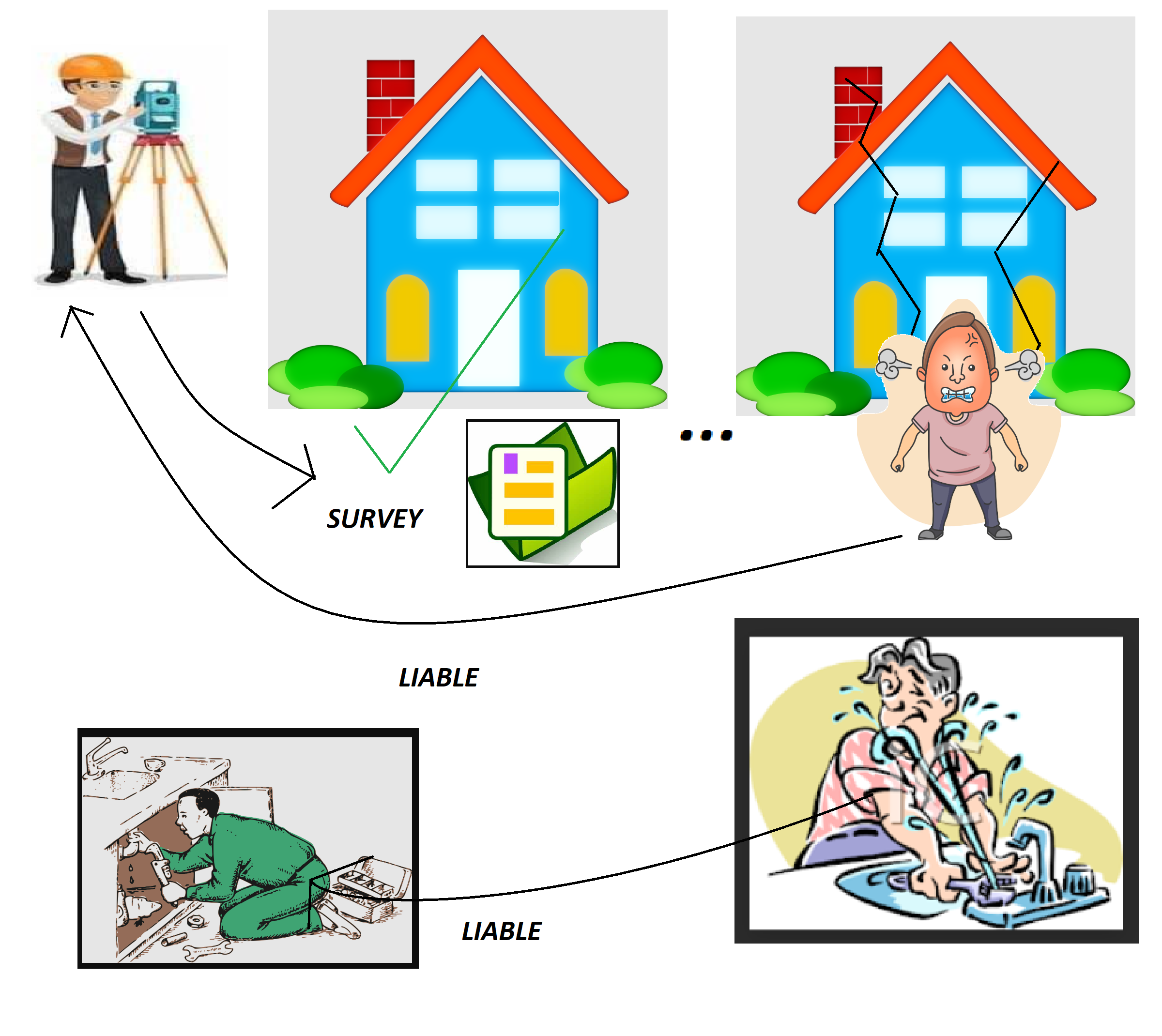Smith v Eric Bush [1990] 1 AC 831
Citation:Smith v Eric Bush [1990] 1 AC 831
Rule of thumb 1:If someone pays money for a product or service and it does not work, is there a presumption of negligence? Yes, if a person can show that a product or service did not work, there is a presumption of negligence by the other party and the onus of proof switches.
Rule of thumb 2:If a surveyor does not warn about defects in a house are they liable for the cost of getting it fixed? Yes, they are.
Background facts:
The facts of this case were that a surveyor provided a report on a house. The surveyor provided this to a bank and the bank passed this on to people who were intending to buy the house. The surveyor failed to notice that there were cracks up the chimney and that this suggested structural damage to the house. A house buyer relied upon this report, bought the house, and soon had a massive repair bill to fix the structural damage.
Judgment:
The Court held that the surveyor had breached their duty to advise upon this. The Court held that even although the surveyor had provided this to the bank, there was sufficient proximity between the house purchaser and the surveyor for a duty of care to be crystallised. The Court further held that the surveyor’s exemption from liability clause did not exclude them from this – for exemption from liability clauses to be effective for commercial losses they have to be for specific things and not general sweeping statements – general exclusion of liability clauses are not also at all effective to exclude from negligence causing person injury.
Green Papers are a relevant source of secondary law that are allowed to be deployed to supplement legal arguments.

Ratio-decidendi:
‘The common law imposes on a person who contracts to carry out an operation an obligation to exercise reasonable skill and care. A plumber who mends a burst pipe is liable for his incompetence or negligence whether or not he has been expressly required to be careful. The law implies a term in the contract which requires the plumber to exercise reasonable skill and care in his calling. The common law also imposes on a person who carries out an operation an obligation to exercise reasonable skill and care where there is no contract. Where the relationship between the operator and a person who suffers injury or damage is sufficiently proximate and where the operator should have foreseen that carelessness on his part might cause harm to the injured person, the operator is liable in the tort of negligence... Manufacturers and providers of services and others seek to protect themselves against liability for negligence by imposing terms in contracts or by giving notice that they will not accept liability in contract in tort. Consumers who have need of manufactured articles and services are not in a position to bargain. The Unfair Contract Terms Act 1977 prohibits any person excluding or restricting liability for death or personal injury resulting from negligence. The Act also contains a prohibition against the exclusion or restriction of liability for negligence which results in loss or damage unless the terms of exclusion or the notice of exclusion satisfies the requirements of reasonableness... Mrs. Smith paid £36.89 to the Abbey National for a report and valuation and the Abbey National paid the appellants for the report and valuation. In each case the valuer knew or ought to have known that the purchaser would only contract to purchase the house if the valuation was satisfactory and that the purchaser might suffer injury or damage or both if the valuer did not exercise reasonable skill and care. In these circumstances I would expect the law to impose on the valuer a duty owed to the purchaser to exercise reasonable skill and care in carrying out the valuation.... serious defects... house was unsaleable... The valuer is and, in my opinion, must be a professional person, typically a chartered surveyor in general practice, who, by training and experience and exercising reasonable skill and care, will recognise defects and be able to assess value. The valuer will value the house after taking into consideration major defects which are, or ought to be obvious to him, in the course of a visual inspection of so much of the exterior and interior of the house as may be accessible to him without undue difficulty’, Lord Templeman (4-11)
‘In the Green Paper "Conveyancing by Authorised Practitioners" see Cmnd. 572, the Government propose to allow building societies, banks and other authorised practitioners to provide conveyancing services to the public by employed professional lawyers. The Green Paper includes the following relevant passages...’ Lord Templeman at 15
Warning: This is not professional legal advice. This is not professional legal education advice. Please obtain professional guidance before embarking on any legal course of action. This is just an interpretation of a Judgment by persons of legal insight & varying levels of legal specialism, experience & expertise. Please read the Judgment yourself and form your own interpretation of it with professional assistance.

